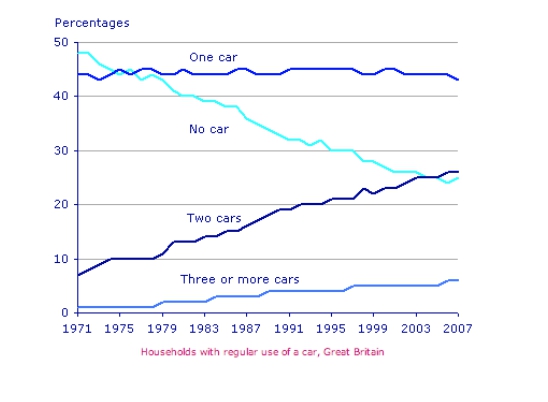2019年6月29日雅思写作考试点评!
来源:网络
小编:环小羊 959最近一次的雅思考试是6月29日,参加考试的学生觉得这次考试的试题难易程度如何呢?本次考试的题型有哪些变化呢?这些都是学生比较关注的,下面环球教育小编为大家整理分享2019年6月29日雅思写作考试权威点评,考生们参考一下:
【作文类型】折线图
【作文题目】car ownership of households in the UK

(参考图)
【综合点评】该表展示了从1971年到2007年这36年间,英国家庭拥有的汽车数量的变化。通过图表,我们可以看到拥有两辆车的家庭的数据增长最快,完全没有车的家庭的比例则一直在下降。
【参考范文】
The graph shows changes in the number of cars per household in Great Britain over a period of 36 years.
Overall, car ownership in Britain increased between 1971 and 2007. In particular, the percentage of households with two cars rose, while the figure for households without a car fell.
In 1971, almost half of all British households did not have regular use of a car. Around 44% of households had one car, but only about 7% had two cars. It was uncommon for families to own three or more cars, with around 2% of households falling into this category.
The one-car household was the most common type from the late 1970’s onwards, although there was little change in the figures for this category. The biggest change was seen in the proportion of households without a car, which fell steadily over the 36-year period to around 25% in 2007. In contrast, the proportion of two-car families rose steadily, reaching about 26% in 2007, and the proportion of households with more than two cars rose by around 5%.
A类大作文
【作文题目】Some people claim that many things that children are taught at school are a waste of time. Other people argue that everything studied at school is useful at some time. Discuss both views and give your own opinion.
【题目分析】观点类作文。这次作文系旧题重考,与2015年9月26号亚太区A类作文题目一致。考察内容比较浅显易懂,虽然表面上看是讨论双方观点,偏向哪一侧都可以,但实际上本题没有悬念,支持后者是最明智的选择。教育话题仍旧是2019年大作文的重头戏,希望考生们能够在平时多积累相关词汇和表达,同时多多训练观点的组织和展开,这样才能做到临阵不乱。
【题材类别】教育类
One of the ongoing discussions about education is focusing on the utilitarian aspect of the school curriculum. While some contend that what the children are taught at school is useless, there are counterviews arising from the public. From my perspective, it is unwise to consider school learning a waste of time.
Undeniably, the value of school education has always been misinterpreted. In this fast-paced and materialistic society, people are evolving to be more impatient and utilitarian than before. For example, what some people expect from school is not how much knowledge can be obtained, but rather, to what degree can school study equip them with the ability to earn money, thus narrowing the learning purpose for all.
However, to a large extent, I still believe knowledge learnt at school is useful. On the personal level, school education plays a leading role in shaping youngsters as qualified workers. For example, professional knowledge, technological skills, and academic theories acquired from school can make young people more employable in the job market. In addition, on the social level, schools are hatchers for new ideas and technologies that can revolutionize the world. Such examples about big companies innovated in campus originally, like Google and Facebook created by young students which have brought tremendous convenience for human’s life, would best prove the idea that it is useful to accept school education.
In summary, in spite of some negative voice, the evidence suggests that students and the society as a whole benefit from school education. If people study with a view to helping themselves learn to pursue a better self , they are likely to see the best outcome.

